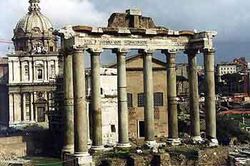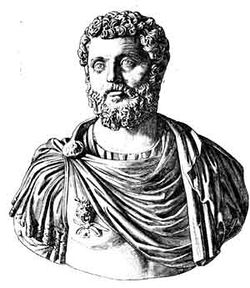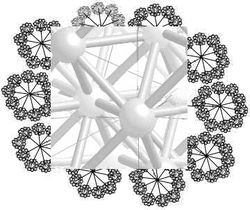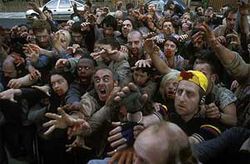Christian conflict: Difference between revisions
No edit summary |
|||
| Line 27: | Line 27: | ||
In one such trial of Christians who practiced private [http://www.hisholychurch.org/news/articles/ThatWordnwv.php religion] rather than worship at the ''civil altars'' of Rome we see that the conflict was simply that the Christians would not sign up for a social welfare system based on the governments right to force members of those systems to contribute. | In one such trial of Christians who practiced private [http://www.hisholychurch.org/news/articles/ThatWordnwv.php religion] rather than worship at the ''civil altars'' of Rome we see that the conflict was simply that the Christians would not sign up for a social welfare system based on the governments right to force members of those systems to contribute. | ||
As Christians, the six principal among those being tried were Speratus, Narzalis, and Cittinus; and three women, Donata, Secunda, and Vestina, declined the proconsul's offer to them of the emperor’s pardon if they would worship the gods of the Romans, and sign up for their system of [http://www.hisholychurch.org/sermon/corban.php Qorban], social welfare. They knew that system of sacrifice made the word of God to none effect. Christians relied upon the Genius of God the Father working through the freewill offerings given in congregations of the Church by faith, hope, and charity. | As Christians, the six principal among those being tried were Speratus, Narzalis, and Cittinus; and three women, Donata, Secunda, and Vestina, declined the proconsul's offer to them of the emperor’s pardon if they would worship the gods of the Romans, and sign up for their system of [http://www.hisholychurch.org/sermon/corban.php Qorban], social welfare. They knew that system of sacrifice made the word of God to none effect. Christians relied upon the Genius of God the [[Father|Father]] working through the freewill offerings given in congregations of the Church by faith, hope, and charity. | ||
Vigellius Saturninus, proconsul of Africa in 180 CE, addressed the seeming antisocial behavior of the twelve Scillitan Christian martyrs with the statement: | Vigellius Saturninus, proconsul of Africa in 180 CE, addressed the seeming antisocial behavior of the twelve Scillitan Christian martyrs with the statement: | ||
Revision as of 09:44, 26 January 2014
Life and Death

The conflict between Christians and the people who persecuted them in the early days of the Church was mostly over their system of social welfare which was managed through their temples like Ephesus, Temple of Saturn and the Parthenon. The Christians depended on a Holy temple made of living stones which was a network of people living by the perfect law of liberty and faith, hope and charity. Those that had shared with those who had true needs.
Our modern ideas of religion differ from the meaning of the word in the days the Bible was written. Pure religion was a religion rooted in charity alone.
Celsus, a Platonist, writing during the term of Marcus Aurelius, “opposed the ‘sectarian’ tendencies at work in the Christian movement because he saw in Christianity a ‘privatizing’ of religion, the transferal of religious values from the public sphere to a private association.” [1]
The difference between public and private welfare is the difference between socialism and charity. The nation of Rome and those of the Pax Romana were all going socialist and made the power of the state their benefactors while Christians were living by love for one another according to the commandments of Christ.

This persecution which began under the Emperor Septimius Severus:
- "Severus returned victorious from having vanquished the kings who had taken part with Nigar against him, he published his cruel edicts against the Christians in the year of Christ 202, the tenth of his reign. But the general laws of the empire against foreign religions, and the former edicts of several emperors against the Christians, were a sufficient warrant to many governors to draw the sword against them before that time; and we find that the persecution was very hot in Africa two years before, under the proconsul Saturninus..." [2]
The emperors maintained the loyalty by the sword and by the temples which supplied free bread and welfare for the people in a welfare state. A welfare state is a "concept of government in which the state plays a key role in the protection and promotion of the economic and social well-being of its citizens. It is based on the principles of equality of opportunity, equitable distribution of wealth, and public responsibility for those unable to avail themselves of the minimal provisions for a good life. The general term may cover a variety of forms of economic and social organization." Welfare state, Britannica Online Encyclopedia
The Church is one form of government appointed by Jesus who was the Christ/Messiah, king of Judea, the remnant of Israel.
Unlike other governments of the world it depends upon charity rather than force. Christians were often dragged before the courts because they failed to worship at the temples of Rome.
Once you realize that these temples had become civil altars that provided the benefits of social welfare you may begin to understand that to worship at those civic altars was done by contributions paid into a central treasury. To worship was to serve through your contributions. And to be a god was simply to be a ruling judge over the collection of your offering and its distribution along with the punishment of those who failed to serve.
In one such trial of Christians who practiced private religion rather than worship at the civil altars of Rome we see that the conflict was simply that the Christians would not sign up for a social welfare system based on the governments right to force members of those systems to contribute.
As Christians, the six principal among those being tried were Speratus, Narzalis, and Cittinus; and three women, Donata, Secunda, and Vestina, declined the proconsul's offer to them of the emperor’s pardon if they would worship the gods of the Romans, and sign up for their system of Qorban, social welfare. They knew that system of sacrifice made the word of God to none effect. Christians relied upon the Genius of God the Father working through the freewill offerings given in congregations of the Church by faith, hope, and charity.
Vigellius Saturninus, proconsul of Africa in 180 CE, addressed the seeming antisocial behavior of the twelve Scillitan Christian martyrs with the statement:
- “We too are religious, and our religion is simple, and we swear by the Genius of our lord the emperor, and we apply for his benefits, as you also ought to do.”
The true Christians like Speratus, one of the twelve who were being tried, would not apply to that Emperor for their daily bread and social security or common welfare, but claimed Christ as “Lord, the King of kings” and ruler of all nations saying:
- "I know not the genius of the emperor of this world; but I serve the God of heaven, whom no mortal man hath ever seen or can see. I never committed any crime punishable by the laws of the state. I pay the public duties for whatever I buy, acknowledging the emperor for my temporal lord; but I adore none but my God, who is the King of kings, and sovereign Lord over all the nations of the world. I have been guilty of no crime, and therefore cannot have incurred punishment."
If you live in almost any country there will be some taxes based on the services such as duties and imposts. But other taxes are based on membership and voluntary application. The Corban of the Pharisees what such a system but it made the word of God to non effect.
You entered that system by signing up and being baptized but Christians had another baptism. If you got the baptism of Christ you were cast out of the system of civic welfare set up by Herod and run through his government temple.
You could no longer get his free bread because you were not a member of his system. Baptism at Pentecost was choosing Jesus as the Christ and your king. You now could share in His free bread that was provided by free will offerings.
- Acts 2:46 "And they, continuing daily with one accord in the temple, and breaking bread from house to house, did eat their meat with gladness and singleness of heart,"
Their entire system of social welfare was now run through the church and their free assemblies as Christ , John the Baptist, Moses and Abraham and all the prophets of God preached for centuries.
- Acts 6:1 "And in those days, when the number of the disciples was multiplied, there arose a murmuring of the Grecians against the Hebrews, because their widows were neglected in the daily ministration."
Most modern Christians are not following in the way of Christ and his system of social welfare by charity alone but have been seeking the system that early Christians died to avoid. The result is that modern society has become fit subjects for tyrants and despots. They have not only weakened the poor but themselves. Christians should turn around and begin to seek the ways of Christ and the prophets by forming charitable systems based not on force but on the love of Christ.
Closer Look
Most people will find it hard to believe that the major conflict between Christians and the world was over social welfare. One of the reasons for this hesitation or refusal is because most Modern Christians have more in common with those who persecuted Christ than they have in common with the followers of Christ.
But the evidence is overwhelming that Christians would not and could not apply to the fathers of the state or the civic altars run through the temples of Rome and other countries for benefits provided by forced contributions.
From the Baptism of John and Herod which divided the Corban of Judea into two types of social welfare to the activities of the early Church we find the evidence clear.
We believe that all the problems in the world are a result of people turning their backs on the ways of God which is the way of Christ.
We believe that one of the reasons the established religion of the day wanted to crucify Christ was because of the conflict between those who promoted a socialist welfare system run by the government that called themselves a benefactor but exercised authority one over the other.
That system of social welfare by societies was called Corban in Israel and Judea. It was called Qorban in Rome and Korban by others. These systems all required sacrifice from the people where what they contributed to the needs of society was managed by chosen public servants. Those servants were called priests at one time but are called bureaucrats today.
Even the Greek word korban is related to the term korbanas, signifying the “temple treasury.” The Jewish historian Josephus makes it clear that funds from the temple treasury were called “corban,” hence could not be used for secular purposes, e.g., city improvements, as in the building of an aqueduct for water supply (Wars 2.9.4).
The same term is translated treasury in Matthew 27:6 "And the chief priests took the silver pieces, and said, It is not lawful for to put them into the treasury, because it is the price of blood."
Pilate had put down riots because the corban, the peoples social security money was used to build an aqueduct. Despite what people like to think there is no separation of funds in these government treasuries so while Pilates actions were brutal his position was legally correct.
Religion was defined at the time of Christ and the constitution as "practice, consisting in the performance of all known duties to God and our fellow men.”
There were two types of systems. The System of Cain, Nimrod, Pharaoh and Caesar operated by forcing the contributions of the people by statutory commands while the system of Abraham, Moses, John the Baptist, Jesus Christ, the Apostles, and the early Church operated by free will offerings or what the Bible calls faith, hope and charity or Paul calls the perfect law of liberty.
The first system weakens society and increases the power of central governments through civil benefactors. The latter strengthens community by awakening virtue in the people and therefore provides the foundation for a free society.
Christ instituted the Church to be those benefactors who do not exercise authority one over the other but feed his sheep, provided daily bread and took care of the daily ministration of the needy in pure religion as Rome declined..
As history is now repeating itself we desire to do what those early Christians were doing. Like the early Church we must be foreign to the state religions which includes social security.

Those that are a part of the Living Network and have read the book Thy Kingdom Comes understand that altars of clay (families) and altars of stone (ministers) are parts of a system of social welfare that have strengthened societies for much of man's history and kept them free. You also should know that the networking of these families and ministers had a structure and pattern that has been repeated successfully by diligent and virtuous people throughout history.
This was done in several ways and depended on the free exercise of choice, which is liberty and charity, which is love for one another and the love of righteousness that is God.
We seek to bring that better plan...the plan that Christ taught the early Church.
All you need is a network of congregations of record and charitable ministers who can be trusted to keep books.
If someone is ill or any emergency arises in those congregations the people go to church and pray with their minister for help and aid is provided through a living network. Christ, Moses and Abraham appointed ministers as living stones of a charitable altar of what was called the Church. Those ministers are a part of a recorded network of ministers established by two or more witnesses.
All the elders (heads of every family/altars of clay) are informed in their congregation/free assembly and all the other ministers/living stones in that established congregation of ministers are notified. The other ministers notify their congregations. Gifts to the ministers are collected and distributed including paying directly to the needs of the people. This may be done by paying negotiated bills for medical treatment or providing medication or resources for health and welfare of the family.
The idea is to:
- Build real relationships within a congregation and network of congregations.
- Distribution is monitored so as to not squander the offerings.
- Bills may be negotiated so as to not squander the offerings.
- Oversight of ministers by a network of ministers and elders themselves determines the honorable meeting of needs to avoid waste and abuse.
- Alternatives are sought within the resources of a whole network of people seeking to serve and love one another.
- You are not alone in the time of other calamities of society because a networking system is already established.
- The people become the benefactors who exercise love for one another which sets them free as they freely provide for one another.
The idea is that congregations of elders come together to be many groups but one flock - His flock of faithful doers of the word.
James 1:22 But be ye doers of the word, and not hearers only, deceiving your own selves.
Health Share works if We Care enough to share our lives with others.
His Church should be your social welfare.
Your ministers should be the benefactors who do not exercise authority one over the other in pure religion
What is given and received as welfare is not a "snare" but a share of one life to another.
John 15:13 Greater love hath no man than this, that a man lay down his life for his friends.
Again - His Church should be your social welfare. You ministers should be the benefactors who do not exercise authority one over the other.
It is not a guarantee either - but true faith, hope and charity.
Join the Living Network in your area and find out more.
John 4:14 But whosoever drinketh of the water that I shall give him shall never thirst; but the water that I shall give him shall be in him a well of water springing up into everlasting life.
== The Living and the Dead ==

Matthew 22:32 I am the God of Abraham, and the God of Isaac, and the God of Jacob? He is not the God of the dead, but of the living.
People of the world have become very selfish. They believe that they can covet their neighbor's goods and go about and take from others so that they will have what they want.
- Luke 12:15 And he said unto them, Take heed, and beware of covetousness: for a man’s life consisteth not in the abundance of the things which he possesseth.
- Deuteronomy 24:6 No man shall take the nether or the upper millstone to pledge: for he taketh a man’s life to pledge.
- Proverbs 1:19 So are the ways of every one that is greedy of gain; which taketh away the life of the owners thereof.
This is a snare in our thinking and that does not give life but deadens our hearts to the compassion needed in a free society. To set up systems that give men the power to take from our neighbors for our benefit is dead works and the work of the dead.
- Hebrews 9:14 How much more shall the blood of Christ, who through the eternal Spirit offered himself without spot to God, purge your conscience from dead works to serve the living God?
Everyman has a right to their labor and no one should take that away without his or her consent. We should not take from others without their freewill giving or we will be taken from until we cry out and no one hears us.
- Ecclesiastes 5:18 Behold that which I have seen: it is good and comely for one to eat and to drink, and to enjoy the good of all his labour that he taketh under the sun all the days of his life, which God giveth him: for it is his portion.
We should take care of the real needs of our neighbors but in a way that gives life through a liberty of individual choice and does not weaken the poor nor strengthen the beast in us all and kills the soul.
- Luke 20:38 For he is not a God of the dead, but of the living: for all live unto him.
This was the message of all the prophets unto Jesus and the early Church. The message of sharing our life with others through a network of living souls caring for one another is a system grandfathered in by the blood of Jesus Christ.
We are facing the new health care plan that is more than just unchristian. It is based on the state being your benefactor and the state, which James calls the world, exercises authority one over the other.
- Matthew 8:22 But Jesus said unto him, Follow me; and let the dead bury their dead.
- Luke 9:60 Jesus said unto him, Let the dead bury their dead: but go thou and preach the kingdom of God.
This is not Pure Religion. This is not the way that Christ wants you to live. He does not want you taking from your neighbor by applying to men who exercise authority one over the other.

Even if it would work for the flesh the price to the soul will be too high. Something has changed in America. We once took care of the needy in our communities without forcing our neighbors to contribute to what we want.
We were a Christian nation but someone has come into our world and carried many off with a new idea, the idea that it is okay to take from others. The whole world seems to come with their hands out to take the sweat and happiness and the life itself from their neighbor. We are in the midst of a Socialist Apocalypse.
- Mark 12:27 He is not the God of the dead, but the God of the living: ye therefore do greatly err.
Your government is not responsive. Over 70% of the people opposed the new health care plan yet three minutes after Congress got a copy they voted for it.
The problem is in part that a great deal of what is called the right is actually left of center. They are not doing the job. But in the beginning the job was yours as the government of the people, for the people and by the people.
- Luke 24:5 And as they were afraid, and bowed down their faces to the earth, they said unto them, Why seek ye the living among the dead?
So what is the answer?
Where can we find a solution?
Where is the cure for a forced health care system that will not work?